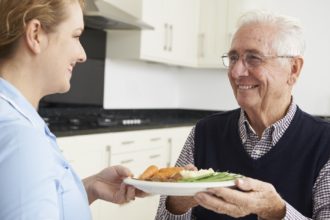While we are all working on the best ways to protect our clients, their families and our staff during COVID-19, we also need to continue good quality care for our clients.
As all aged care providers are aware, the next set of National Quality Indicator Program (NQIP) reporting is due for the Jan-March quarter very soon.
It is a timely reminder that weight loss is a real risk for clients during this time of uncertainty.
This issue of Nutrition Matters will discuss the impact COVID-19 can have on rates of unplanned weight loss.
Unplanned weight loss
The NQIP requires aged care providers to report clients who experience:
- 3 consecutive weight losses in 3 months
- 3kg or more total weight loss in 3 months
Clients are at risk of weight loss, now more than ever
Appetite and ultimately food intake for our clients may be impacted by:
- Mental health influences of the media coverage of the virus
- Reduced ability to spend time with family and friends
- Reduced ability to eat away from the facility, which for some clients gives an important eating opportunity during their day or week
- Reduced social outings organised by the facility, which would also often include opportunities to eat together and stimulate appetite
We need to use all the tools in our toolbox to support clients with their appetite
Lots of homes have strategies and a policy to implement when a client loses weight or is seen to be eating less. Now is the time for all staff to be aware of these strategies and be ready to use them. These may include:
- Food first interventions and food fortification
- High Protein milk drinks and smoothies
- Short order items, grazing plates and tapas-style ‘finger foods’
- And of course, involving your dietitian to review any clients where additional supports are needed
Non-food interventions can also make a world of difference
While offering nutritious food and lots of options is useful, we shouldn’t forget that human touch is incredibly important in supporting our clients. With lots of understanding and empathy for the impacts COVID-19 may have on clients, we can support them through this. Sharing a quiet moment, a cup of tea and a small bite to eat can also brighten a client’s day enough for them to eat or drink a little bit more.
Your Leading Nutrition dietitian is here to support your clients and limit the nutrition impacts of COVID-19. This might be helping to collate your NQIP data to free up time for staff to provide care to clients, assessing clients at high nutrition risk, or even to run education with staff on how to improve appetite and eating.



